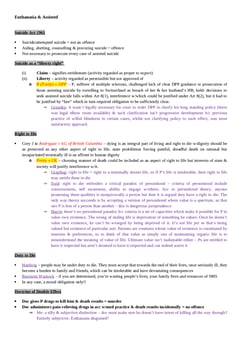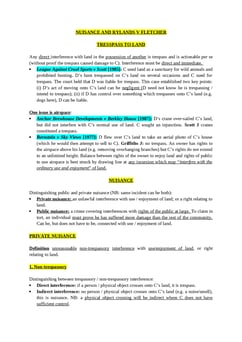Chester v Afshar [2004] 3 WLR 587
Judgement for the case Chester v Afshar
Table Of Contents
Defendant breached his tortious duty to Plaintiff to warn her of the possible complication of an operation and this complication occurred.
However Plaintiff was unable to prove that had she been told of the risk, she would not have undergone the operation. Thus the “but for” test was not made out.
-
However, HL by majority held that the purpose of the law was the vindication of rights and providing remedies for breaches of rights.
Causation could not be separated entirely from policy considerations and thus, in this case, the principles of causation would be modified, since the breach of the duty had inhibited the patient’s consent (it was not an informed consent).
Since this breach was within the sphere of Defendant’s duty to Plaintiff, Defendant would be made liable to Plaintiff.
-
Majority also ruled that while such modifications would be “exceptional”, they could not be limited to a given set of facts.
This is an extension of the law since, while Fairchild widened liability to those who would be likely to have caused the harm (albeit with the high risk of punishing a person who didn’t cause it), Chester completely ignores the requirement to show causation of the harm inflicted (in the circumstances where it applies).
Hence the majority are wrong to call it a “modification” of the causation principles, given that it is really a dispensation of the causation principles.
Lord Steyn (majority)
The right of a patient to consent to an operation and to be informed of the risks is very important and must therefore be given legal force.
He then says that Fairchild has shown that in certain cases the causation principles can be modified (though this is really dispensation) where justice and policy demand it (this will mean legal uncertainty.).
-
He says that concerns over a patient’s autonomy fulfil the “justice and policy” requirements.
This case is NOT within the Fairchild guidelines because that only permitted cases of “increasing the material risk”.
The doctor’s failure to warn Defendant of the dangers did NOT increase the material risk since Plaintiff would have undergone the operation anyway.
Minority (Hoffmann, Bingham)
-
Hoffmann argues:
-
That the “value” of being told he risk beforehand would be hard to quantify
(Courts put values on things the whole time: if the European Courts of Human Rights can put values on breaches of ECHR rights, then there s no reason why the HL could not value the right to be informed).
-
The costs of litigation would make litigation on the matter useless since the award would be very low.
(This assumption that the award would be low negates his point that it would be hard to value the right to be informed AND the cost-benefit margins would make the law a natural deterrent to bringing these cases so this is a concern for litigants, not judges).
-
Lord Bingham argues simply that the current law’s rules do not permit compensation (he doesn’t engage with arguments over the possible extension).
----
The reason for having causation is because it is unfair to punish someone for harm that does not flow from them: hence it would seem fair to make an award to compensate the breach of the right to be informed, BUT this does not mean that the doctor should have to be liable for physical harm, which he did not cause!
RELATED CASES
For Further Study on Chester v Afshar
Need instant answers? Our AI exam tutor is here to help.
Ask questions 🙋 Get answers 📔 It's simple 👁️👄👁️
Our AI is educated by the highest scoring students across all subjects and schools. Join hundreds of your peers today.
Get StartedSimilar Cases
Related Product Samples
These product samples contain the same concepts we cover in this case.
| Medical Law | Consent I Notes (19 pages) |


 Since 2010, Oxbridge Notes has been a trusted education marketplace, supplying high-quality materials from top achievers at universities like Oxford, Cambridge, LSE, Harvard, and Yale.
Since 2010, Oxbridge Notes has been a trusted education marketplace, supplying high-quality materials from top achievers at universities like Oxford, Cambridge, LSE, Harvard, and Yale.